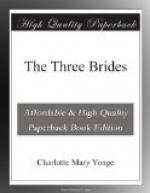“Think that you prize the soul more than the body,” said Julius, as she halted in search of a word. “I understand, Cecil; you would not be in the prevailing fashion. I don’t want to argue that point, only to understand about Anne.”
So saying, he went at once to Anne’s abode, the old schoolroom, which, like everything else belonging to Mrs. Miles Charnock, had a sad-coloured aspect, although it had been fitted up very prettily. The light was sombre, and all the brighter pictures and ornaments seemed to have been effaced by a whole gallery of amateur photographs, in which the glories of the African bush were represented by brown masses of shade variegated by blotches of white. Even in Miles’s own portrait on the table, the gold seemed overwhelmed by the dark blue; and even as Julius entered, she shut it up in its brown case, as too sacred for even his brother’s eyes.
However, a flush of pleasure came to her pale face at the invitation to take a class, and to read to a good old woman, whom in his secret soul he thought so nearly a dissenter, that she could not be made more so. She promised her help with some eagerness for as long as she should remain in England, and accepted the books he gave her without protest. Nay, that same evening she took Jenny off into her gray abode, to consult her whether, since she must now join the early breakfast, she could go to daily service without becoming formal.
She even recurred to her question, whether Julius was a Christian, without nearly as much negation in her tones as before; and Jenny, taking it as it was meant, vouched for his piety, so as might render it a little more comprehensible to one matured on Scottish Calvinism and English Methodism, diluted in devout undogmatic minds, with no principle more developed than horror of Popery and of worldliness. Turned loose in solitude, reserve, and sadness, on her husband’s family, who did nothing but shock her with manifestations of the latter, she could hardly turn even to the clerical portion of it, while Julius, as well as his curates, bore all the tokens by which she had been taught to know a Papist. Daily intercourse was perhaps drawing her a little towards her brother-in-law; but Herbert Bowater united these obnoxious externals to a careless tongue, and joyous easy-going manner, and taste for amusement, which so horrified Anne, that she once condoled with his sister, and proposed to unite in prayer for his conversion; but this was more than Joanna could bear, and she cried, “I only wish I were as good a Christian as dear Herbert!”
For indeed, the sister’s heart intensely esteemed his sweetness, honesty, and simplicity, even while she found it an uphill task to coax him to steady work. After that first morning he was indeed ashamed to let her see the proportion between his pastoral visits and his theological reading; but the newspapers (he had two or three weekly ones) had a curious facility of expansion, and there was a perilous sound in “I’ll just see where the meet is,”—not that he had the most distant idea of repairing thither; it was pure filial interest in learning where his father and Edith would be.




